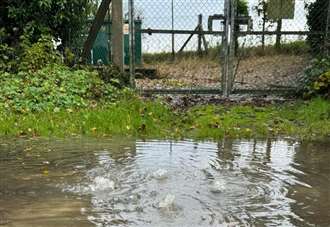-
 play_arrow
play_arrow
KL1 RADIO KL1 Radio Local Radio for West Norfolk
-
 play_arrow
play_arrow
KL DISCO KL Disco Playing Disco Music from the 70's onwards.24/7
-
 play_arrow
play_arrow
KL COUNTRY KL COUNTRY Playing New and Classic Country Music 24/7
-
 play_arrow
play_arrow
KL ROX KL ROX The best of New and Classic Rock.24/7
-
 play_arrow
play_arrow
KL SUMMER Summer Vibes 24/7 from KL1 Radio across West Norfolk
-
 play_arrow
play_arrow
KL CHILL Just Chill!
-
 play_arrow
play_arrow
KL POP The Best POP Hits all day Long!
-
 play_arrow
play_arrow
KL XTRA KL XTRA, The PopUp Station from KL1
music_note
‘It’s a complete scandal’: Sewage flowed into rare chalk stream for 1,600 hours last year


Sewage flowed for more than 1,600 hours from a treatment works into a rare chalk stream last year, figures have revealed.Data from the Environment Agency has shown that wastewater from the works in Grimston spilled into the Gaywood River which rises near Derby Fen in West Norfolk before flowing into Lynn.The ‘spills’ came from storm overflows, which dump untreated sewage into rivers and the sea, usually during periods of heavy rainfall to stop sewers from backing up and flooding.
The figures also revealed that Belaugh, a tiny village on the Norfolk Broads, was the location with the most sewage spills in the entire county.The shocking figures emerged in a huge release of data from the Environment Agency, which said there were a total of 3.6 million hours of spills compared to 1.75 million hours in 2022. Overall, Anglian Water, which is responsible for much of the region’s sewer network, had the biggest increase in spills of all England’s water companies.
The data has led to calls from MPs and councillors for a national environmental emergency to be declared to help tackle the problem.Norfolk County Councillor Rob Colwell, who is also running as a Liberal Democrat to become North West Norfolk MP, said: “It is a complete scandal that filthy sewage is being pumped into our stunning Norfolk Broads and our county’s rivers and waterways.“There should be a national emergency declared.”Water companies are allowed to release sewage through storm overflows when the system is overwhelmed during heavy rain in order to help prevent flooding.
However, the issue has become a growing scandal across the country and has led to people demanding for the practice to be stopped. Figures from Defra show wastewater is the source of 36% of pollution affecting rivers and lakes, while 40% is from runoff of pesticides, fertilisers, slurry and soil from farming.Anglian Water has said it is “working hard” to drive down the number of spills and is investing £50m into a ‘spills taskforce’ to tackle the problem, while £113m has been invested to tackle spills in Norfolk alone, such as at Fakenham, Horning and Norwich. An Anglian Water spokeswoman has said they are “disappointed to see our spill numbers have increased” but added the exceptionally wet weather in late 2023 compared to a much drier year previously had contributed to the stark increase.She added: “We are confident that investments we’ve been making to reduce spills have moved the dial in the right direction and spills would have been considerably higher without it.” Water Minister Rebecca Pow said the volume of sewage being “discharged into our waters is unacceptable and we are taking action to make sure polluters are held to account”.But critics, which include campaigner Feargal Sharkey, believe not enough is being done by Defra and the Environment Agency to clamp down on water companies.Labour’s shadow environment secretary Steve Reed has urged the government to immediately ban bonuses for water companies found to be polluting waterways and has said his party would impose tougher measures on the firms.
Similar posts
Upcoming shows

Kelvin Scott – Weekend Breakfast
8:00 am - 11:00 am

Vicky Green – Classic Hit Lunchtime
11:00 am - 1:00 pm

Darren Furzey – Classic Hit Weekend
1:00 pm - 3:00 pm

Lee Vincent – Classic Hit Saturday
3:00 pm - 6:00 pm

James Roberts – Saturday Anthems
6:00 pm - 8:00 pm
-

Sir Keir Starmer hails ‘excellent’ Team GB athletes ahead of Paris Olympics

Celine Dion makes return to public performance at Olympics opening ceremony

Families pay tribute to four men killed after their car crashed into a tree

Reeves expected to approve inflation-busting pay hikes for public sector workers

Paris Olympics off to a sodden start with a rain-drenched opening ceremony
Message Us Now!
Copyright The Mediasite UK - 2023.



